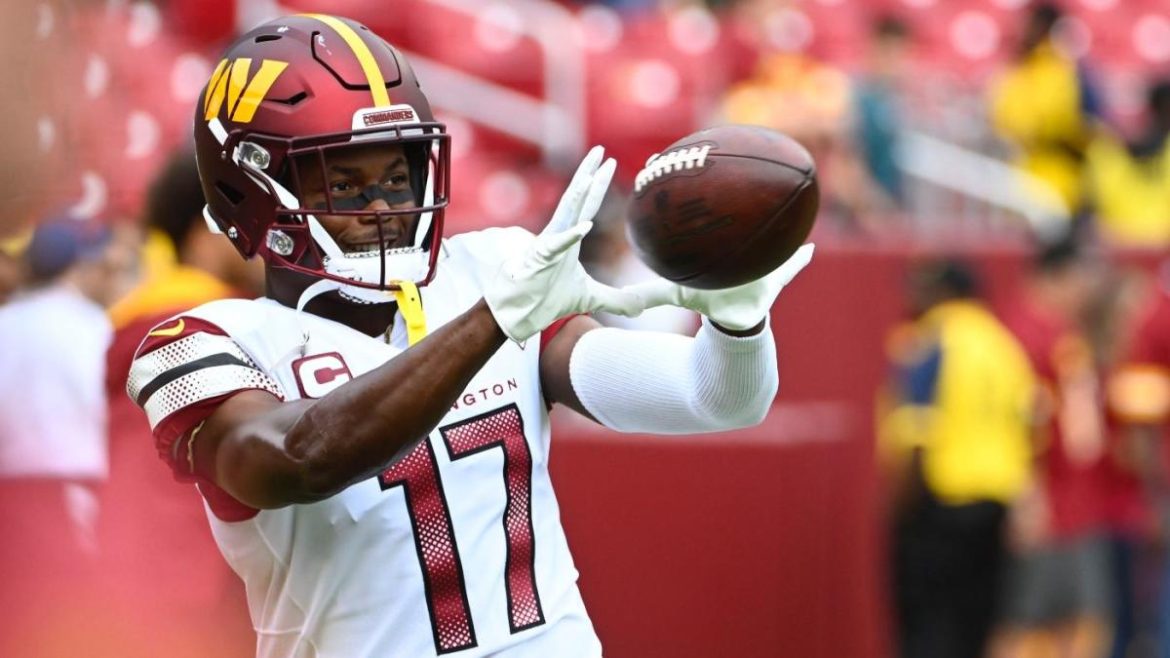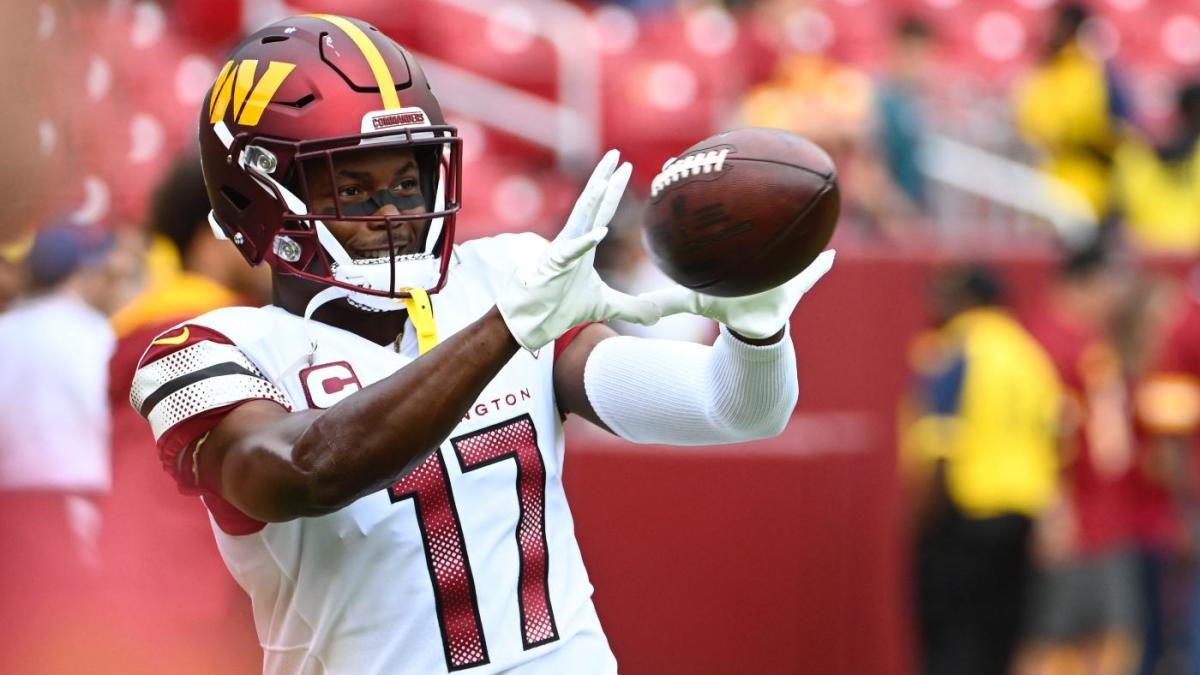The Terry McLaurin Saga: A Delicate Dance Between Player, Team, and Future
The Seeds of Discontent: McLaurin’s Contract Situation
Terry McLaurin’s journey from a third-round draft pick to a top-tier wide receiver has been nothing short of remarkable. Since joining the Washington Commanders in 2019, McLaurin has consistently outperformed expectations, establishing himself as the team’s primary offensive weapon. His exceptional route-running skills, reliable hands, and consistent performance have made him a favorite target for quarterbacks and a constant threat to opposing defenses. However, as he entered the final year of his rookie contract, McLaurin found himself at a crossroads, seeking a long-term extension that reflected his value to the team.
The wide receiver market had seen a significant shift in recent years, with players like Tyreek Hill, Davante Adams, and Cooper Kupp securing massive deals. McLaurin, undoubtedly, sought to join their ranks, aiming to secure his financial future and solidify his place among the league’s highest-paid receivers. However, negotiations between McLaurin’s representatives and the Commanders’ front office apparently stalled. The exact details of the contract dispute remain largely confidential, but reports suggest that the two sides were not aligned on the total value of the contract, the guaranteed money, or the length of the deal. This impasse led to McLaurin’s decision to hold out of training camp, a calculated move designed to increase pressure on the Commanders to meet his demands.
The Holdout Gambit: A Risky but Potentially Rewarding Strategy
Holding out of training camp is a time-honored tradition in the NFL, a tool employed by players seeking to leverage their value and force their teams to the negotiating table. The strategy carries significant risks. Players who hold out are subject to fines, miss valuable practice time, and risk damaging their relationships with coaches and teammates. However, the potential rewards can be substantial. A successful holdout can result in a lucrative contract extension, providing financial security and validating the player’s worth.
McLaurin’s decision to hold out was particularly noteworthy. He had established himself as a respected leader in the Commanders’ locker room and was widely regarded as a team player. By choosing to hold out, he risked tarnishing his reputation and alienating fans who had embraced him as one of the team’s brightest stars. Despite these risks, McLaurin clearly believed that a holdout was necessary to achieve his contract goals. He understood that the Commanders were facing a critical juncture. With a new quarterback in Jayden Daniels and a renewed sense of optimism surrounding the team, McLaurin’s presence was essential for the Commanders to compete in a tough NFC East division. McLaurin’s camp likely reasoned that the Commanders could not afford to enter the season without their top receiver and would eventually be forced to meet his demands.
The Commanders’ Response: A Balancing Act of Resolve and Pragmatism
The Commanders’ response to McLaurin’s holdout was carefully calculated, balancing a show of resolve with a pragmatic understanding of the situation. Publicly, the team maintained a calm and business-as-usual approach. Coaches and teammates expressed support for McLaurin, emphasizing his importance to the team while also reiterating their commitment to focusing on the players who were present at training camp. Behind the scenes, however, the Commanders were undoubtedly working diligently to find a resolution. They understood that McLaurin was a valuable asset and that a prolonged holdout would be detrimental to the team’s chances of success. The Commanders also had to consider the broader implications of their decision. Giving in too easily to McLaurin’s demands could set a precedent for future contract negotiations, potentially emboldening other players to hold out in pursuit of bigger paydays.
The Commanders’ strategy appeared to be one of patience and negotiation, aiming to find a compromise that satisfied McLaurin’s demands without breaking the bank or jeopardizing the team’s long-term financial stability. This approach demonstrated the team’s commitment to retaining McLaurin while also ensuring that they did not compromise their financial future.
Hold-In: A Calculated Return
After missing the first four days of training camp and incurring $200,000 in fines, McLaurin reported to the team. However, he was promptly placed on the Physically Unable to Perform (PUP) list. This move was widely interpreted as a “hold-in,” a compromise strategy where the player reports to camp to avoid further fines but does not participate in practice until a contract agreement is reached. McLaurin’s decision to end his holdout and report to camp was a strategic move, signaling a willingness to negotiate while maintaining leverage. By reporting, he avoided further financial penalties and demonstrated a commitment to his teammates. However, by remaining on the PUP list, he continued to exert pressure on the Commanders to finalize a contract extension.
This “hold-in” strategy is not uncommon in the NFL, as it allows players to maintain their leverage while also showing a willingness to engage in negotiations. It is a delicate balance, as players must navigate the fine line between exerting pressure and maintaining a positive relationship with their team.
Implications and Future Outlook
The Terry McLaurin saga highlights the complex dynamics of NFL contract negotiations and the delicate balance between player empowerment and team control. McLaurin’s actions underscore the increasing leverage that star players wield in the modern NFL, while the Commanders’ response demonstrates the challenges teams face in managing their salary cap and maintaining roster stability. Ultimately, the McLaurin situation will have implications beyond the confines of Washington. It will serve as a case study for other players and teams navigating contract disputes, shaping future negotiation strategies and influencing the market value of wide receivers across the league.
The saga also sheds light on the evolving landscape of the NFL, where player empowerment is on the rise, and teams must navigate the delicate balance between retaining their star players and maintaining financial stability. As the league continues to evolve, the dynamics of contract negotiations will undoubtedly become even more complex, with players and teams engaging in a delicate dance to secure their respective goals.
Resolution: A Win-Win Scenario?
The ideal resolution to the McLaurin saga would be a contract extension that satisfies both parties. For McLaurin, this would mean securing a long-term deal that reflects his value as one of the NFL’s top receivers, providing financial security and validating his contributions to the team. For the Commanders, this would mean retaining a key offensive weapon while maintaining a manageable salary cap and preserving roster flexibility. Whether a win-win outcome is achievable remains to be seen. However, the fact that McLaurin reported to camp and engaged in negotiations suggests a willingness to find common ground. The Commanders, likewise, have demonstrated a commitment to retaining McLaurin, recognizing his importance to the team’s success.
As the negotiations continue, both parties will need to navigate the complexities of the situation, balancing their respective goals with the realities of the NFL landscape. The outcome of the McLaurin saga will undoubtedly have implications for the Commanders’ future and the broader NFL landscape, shaping the dynamics of contract negotiations for years to come.
A Chapter Concludes, the Story Continues
The Terry McLaurin holdout/hold-in situation is more than a simple contract dispute. It’s a reflection of the modern NFL, where player value is constantly debated and the pursuit of fair compensation often leads to tense standoffs. While the immediate drama may subside with a new contract, the underlying themes of player empowerment, team strategy, and the ever-evolving financial landscape of professional football will continue to shape the sport for years to come. The McLaurin saga serves as a reminder of the delicate balance between player and team, and the complex dynamics that define the modern NFL. As the story continues to unfold, it will undoubtedly provide valuable insights into the future of the league and the evolving relationship between players and teams.





